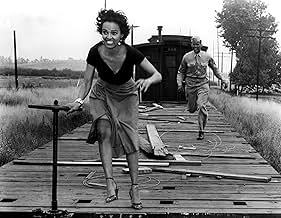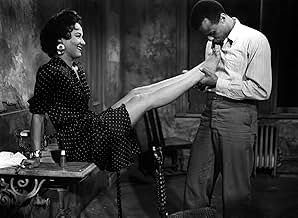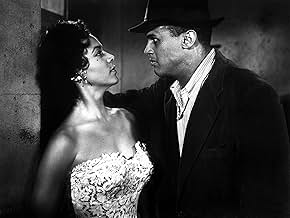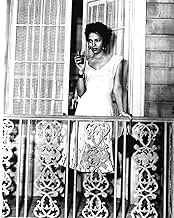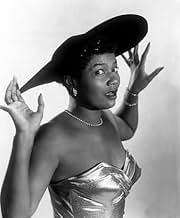Carmen Jones
- 1954
- Tous publics
- 1h 45m
IMDb RATING
6.7/10
6.2K
YOUR RATING
Contemporary version of the Bizet opera, with new lyrics and an African-American cast.Contemporary version of the Bizet opera, with new lyrics and an African-American cast.Contemporary version of the Bizet opera, with new lyrics and an African-American cast.
- Director
- Writers
- Stars
- Nominated for 2 Oscars
- 6 wins & 8 nominations total
Brock Peters
- Sergeant Brown
- (as Broc Peters)
LeVern Hutcherson
- Joe
- (voice)
- (as Le Vern Hutcherson)
Marilyn Horne
- Carmen Jones
- (voice)
- (as Marilynn Horne)
Marvin Hayes
- Husky Miller
- (voice)
Alvin Ailey
- Dance Soloist
- (uncredited)
DeForest Covan
- Trainer
- (uncredited)
Joseph E. Crawford
- Dink Franklin
- (singing voice)
- (uncredited)
Carmen De Lavallade
- Dance Soloist
- (uncredited)
Bernie Hamilton
- Reporter
- (uncredited)
Margaret Lancaster
- Singing Voice
- (uncredited)
- Director
- Writers
- All cast & crew
- Production, box office & more at IMDbPro
Featured reviews
You may guess that I love Bizet's opera Carmen, it is somewhat tragic but very passionate. While updated, this film directed wonderfully by the talented Otto Preminger is a wonderful contemporary version of the opera, still maintaining Bizet's wonderful music and inspired lyrics from Oscar Hammerstein II. Whether it is the definitive film version of the opera I am not sure, I absolutely adore the 1984 film with Placido Domingo and Julia Mignes-Johnson. That aside, this film is really handsomely shot, with beautiful crisp cinematography and stunning scenery. And of course the music is outstanding "Dat's Love", "Dis Flower", "Stan' Up an' Fight" and "Dere's a Cafe on de Corner" really do stand out. The story is a beautiful, tragic, compelling one, not at all confusing. And the performances are marvellous, Dorothy Dandridge is superb as Carmen Jones. She is gorgeous, flirtatious and sexy, everything Carmen in the opera should be. Harry Belafonte does a great job as Joe, the man consumed for the passion of Carmen, so much so he is driven to murder. Olga James is heart breaking as Cindy-Lou, Pearl Bailey is a delightful Frankie, Joe Adams is a great Husky Miller and Brock Peters is effective as Sergeant Brown. I have heard complaints that the singing was awful, and I disagree completely. Marilyn Horne has a beautiful singing voice and she did well as Carmen. She has been better though, she has a much stronger voice than what was heard here. And LeeVern Hutcherson has a lovely tenor voice, quite lightweight and sensitive when it needs to be. And Marvin Hayes has a very resonant voice that is needed for his character. If the singing was a little quiet at times, do bear in mind sound and technology wasn't as good then than it is now. My real complaint was that the lip-synching was a little behind the singing at times, but other than that, this is a great film. 9/10 Bethany Cox
to see this amazing film. I thought Halle Berry did a great job in the Dandridge biopic, but after seeing Carmen Jones I don't know if she could do Dorothy justice. This woman was amazing in this film. she RADIATED sex appeal and I could see why her performance was groundbreaking. Otto Preminger directed and shot a beautiful film, and contemporary actors, especially black actors, should set the performances in this movie as highwater marks to shoot for. Pearl Bailey was amazing in addition to the two leads, Belafonte and Dandridge. Joe Adams as the boxer and the woman who played Cindy Lou also gave great performance.
Again to see black actors in this time period given a chance to perform a full range of characters was really amazing. In a lot of ways this film is more progressive than the drivel of black genre films coming out of Hollywood today
Again to see black actors in this time period given a chance to perform a full range of characters was really amazing. In a lot of ways this film is more progressive than the drivel of black genre films coming out of Hollywood today
Dorothy Dandrige's roles went beyond that of sex symbol to being a parody of female sexuality
Carmen Jones is a powerful display of her appeal
Based on Bizet's operatic masterpiece, Otto Preminger's film is the story of a GI about to go to flying school (Harry Belafonte), a noble young man who loves the cigarette-maker Carmen very dearly
Filled with passionate songs and a first-rate supporting cast, the movie is filled with exciting musical numbers that are necessary to the film But as impeccable and skillful the supporting cast is, this is Dandrige's magnetic star of enduring international appeal Her Carmen is a flame of fire, isolating in a few moments the essence of her attraction Her enigma sustained throughout a career notable for its startling changes of tempo and direction Her shapely figure, blazing eyes, with the air of the unexpected add up a touch of melancholy to even the most routine sequences Her performance was a parable of love and its power to destroy if misused
Based on Bizet's operatic masterpiece, Otto Preminger's film is the story of a GI about to go to flying school (Harry Belafonte), a noble young man who loves the cigarette-maker Carmen very dearly
Filled with passionate songs and a first-rate supporting cast, the movie is filled with exciting musical numbers that are necessary to the film But as impeccable and skillful the supporting cast is, this is Dandrige's magnetic star of enduring international appeal Her Carmen is a flame of fire, isolating in a few moments the essence of her attraction Her enigma sustained throughout a career notable for its startling changes of tempo and direction Her shapely figure, blazing eyes, with the air of the unexpected add up a touch of melancholy to even the most routine sequences Her performance was a parable of love and its power to destroy if misused
It's incredible that it took an Austrian director, Otto Preminger, the courage to bring this wonderful screen adaptation of the Bizet's immortal opera Carmen to the American public. As a musical, "Carmen Jones" had been seen, successfully, on Broadway, because of the many talented black performers that weren't allowed to be seen in Hollywood movies. Preminger had a knack for tackling issues that other, better known directors, stayed away from.
"Carmen Jones", as seen today, shows us a film that is somehow dated, but when it made its debut, it surprised a lot of people because it was a revolutionary work, something the American movie goers weren't used to seeing. The strength of the film lies in the performances Mr. Preminger got from his multi-talented cast.
The adaptation of the opera sets the film in the South. We are taken to a military base during the war. The local people work in the factory, attached to the base, making parachutes and other war related equipment. Carmen Jones, is the sultry young woman who sticks out from the rest of her co-workers, not only by her beauty, which was obvious, but by the way she can reduce men to servitude, which is what happens to Joe, the man who is being promoted until fate intervenes and Carmen renders him useless.
The gorgeous Dorothy Dandridge made a magnificent Carmen Jones. In fact, this was Ms. Dandridge's best screen work because she smolders the screen every time she is seen in the film. Harry Belafonte is Joe, the man whose passion for the lovely Carmen will consume him and will not let him see straight. Pearl Bailey is a delight in her take of Frankie. Olga James is seen as the sweet Cindy Lou, the girl in love with Joe. Joe Adams, Brock Peters and a young Diahann Carroll are also seen in minor roles.
Some comments to the IMDb forum express their displeasure at the way the voices are heard. This seems to have been the only thing that Preminger should have worked with his collaborators Oscar Hammerstein II and Harry Kleiner into having the opera melodies sung naturally, the way one would expect Ms. Dandridge, who could sing, and of course, Harry Belafonte, a wonderful singer, to deliver them in a way that would have pleased those audiences not accustomed to hearing classical opera.
Regardless of what we think today, this was one of the breakthroughs that proved to America they could enjoy black performers on their merits and talent. Otto Preminger must be praised for being a pioneer in this field and for daring to be a man ahead of his time.
"Carmen Jones", as seen today, shows us a film that is somehow dated, but when it made its debut, it surprised a lot of people because it was a revolutionary work, something the American movie goers weren't used to seeing. The strength of the film lies in the performances Mr. Preminger got from his multi-talented cast.
The adaptation of the opera sets the film in the South. We are taken to a military base during the war. The local people work in the factory, attached to the base, making parachutes and other war related equipment. Carmen Jones, is the sultry young woman who sticks out from the rest of her co-workers, not only by her beauty, which was obvious, but by the way she can reduce men to servitude, which is what happens to Joe, the man who is being promoted until fate intervenes and Carmen renders him useless.
The gorgeous Dorothy Dandridge made a magnificent Carmen Jones. In fact, this was Ms. Dandridge's best screen work because she smolders the screen every time she is seen in the film. Harry Belafonte is Joe, the man whose passion for the lovely Carmen will consume him and will not let him see straight. Pearl Bailey is a delight in her take of Frankie. Olga James is seen as the sweet Cindy Lou, the girl in love with Joe. Joe Adams, Brock Peters and a young Diahann Carroll are also seen in minor roles.
Some comments to the IMDb forum express their displeasure at the way the voices are heard. This seems to have been the only thing that Preminger should have worked with his collaborators Oscar Hammerstein II and Harry Kleiner into having the opera melodies sung naturally, the way one would expect Ms. Dandridge, who could sing, and of course, Harry Belafonte, a wonderful singer, to deliver them in a way that would have pleased those audiences not accustomed to hearing classical opera.
Regardless of what we think today, this was one of the breakthroughs that proved to America they could enjoy black performers on their merits and talent. Otto Preminger must be praised for being a pioneer in this field and for daring to be a man ahead of his time.
This is the story of a soldier, Joe (Harry Belafonte) and a fiery lady, Carmen (Dorothy Dandridge) and their unlikely relationship which begins with Joe trying to transport Carmen to the brig...and ends up with the pair falling in love.
If you are looking to see a classic opera translated into more modern times and with entirely new lyrics, then "Carmen Jones" is definitely for you. However, regardless of its all-black cast, this is clearly a film that is for very select folks! You hate opera well then the film will be a tough sell! As for me, I would have enjoyed the music OR the story. The total package didn't hold my interest. But this does NOT mean the film is bad or poorly made...it's not. It's all a matter of personal taste.
If you are looking to see a classic opera translated into more modern times and with entirely new lyrics, then "Carmen Jones" is definitely for you. However, regardless of its all-black cast, this is clearly a film that is for very select folks! You hate opera well then the film will be a tough sell! As for me, I would have enjoyed the music OR the story. The total package didn't hold my interest. But this does NOT mean the film is bad or poorly made...it's not. It's all a matter of personal taste.
Did you know
- TriviaEartha Kitt was offered the role of Carmen, but the studio wanted her singing voice to be dubbed, so that her character would have an operatic voice. The same offer was made to Harry Belafonte and Diahann Carroll who accepted, but Kitt refused, wanting to use her natural voice. Dubbing was not required for Pearl Bailey, whose own voice suited her comedic songs.
- GoofsThe story takes place circa 1944, but all of the women's fashions and hairstyles are strictly 1954; when Carmen and Frankie are talking outside the Chicago Pawn Shop, 1950s-era automobiles passing by can clearly be seen reflected in the showcase window.
- Quotes
Carmen Jones: I always did want to see the big town.
Frankie: You got your wish, honey. Somethin' tells me Chicago's gonna be real good for you.
Myrt: Somethin' tells me you gonna be real *bad* for Chicago.
- Crazy creditsThe opening credits and end title are set around a flaming rose.
- ConnectionsFeatured in Small Steps, Big Strides: The Black Experience in Hollywood (1998)
- How long is Carmen Jones?Powered by Alexa
Details
- Release date
- Country of origin
- Language
- Also known as
- Oscar Hammerstein's Carmen Jones
- Filming locations
- Southern Pacific railroad crossing at 8746 E Los Angeles Avenue, aka California Highway 118, Moorpark, California, USA(scene where Carmen attempts escape from the Jeep)
- Production company
- See more company credits at IMDbPro
Box office
- Budget
- $750,000 (estimated)
- Runtime1 hour 45 minutes
- Color
- Aspect ratio
- 2.55 : 1
Contribute to this page
Suggest an edit or add missing content



